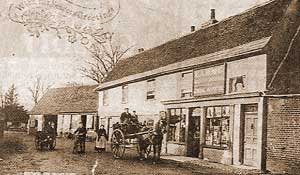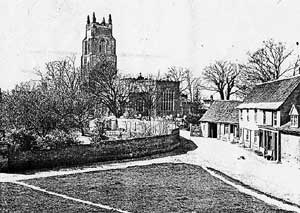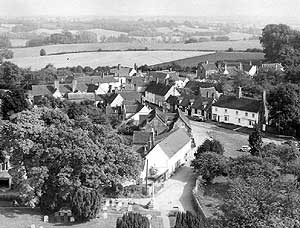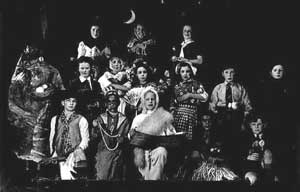How very different life was in my childhood, from what it is today! So said Miss Josephine Newman, who was born at Weylands Farm, Stoke-by-Nayland, Suffolk on 10 January 1938. She was only there for several years with her brother, Michael, more than three years her senior, and recollections of life on the farm are necessarily sketchy, but here they are: - One or two incidents are firmly engraved on my mind. I was born a year before the Second World War broke out, and the most dramatic incident I can recall occurred during the war. One day while we were having dinner, we heard a commotion going on outside, so we all rushed out to see what was happening. I can clearly remember us all looking up at the sky and seeing a dog fight between a Spitfire and a German plane, which was very exciting, though of course, I was too young to understand what was going on. Other memories of life on the farm include seeing lots of dear little fluffy chicks in their incubators and our two lovely horses, Shorty and Bess. I can also recall a nasty cockerel of which I was very much afraid. My brother liked to chase the hens and was told off for so doing. On one occasion, I went off on my own, unbeknown to my parents, and drove a cow down to the meadow all by myself. | 
The village shop at Stoke-by-Nayland, run by Edgar Howe, not only supplied groceries but doubled as a drapers and outfitters, where deliveries were still made by pony and trap in the early 1900s. Behind the trap is the house where young Josephine and Michael Newman lived. On the left is the blacksmith's forge, which has since been demolished, and the shop has now been converted to a dwelling.
| After a few years on the farm we moved up to the main part of the village of Stoke-by-Nayland, where we lived right next door to the village shop owned and run by my uncle, Ronald Howe, and we were right by the fine church whose magnificent tower was painted by John Constable, an avid admirer. Every Sunday we woke to the ringing of the church bells. At this time, in the early 1940s, Stoke had no electricity; hence we had 'to go upstairs by candlelight'. We also had paraffin lamps on the drawing room table. Occasionally, the glass for the lamp cracked and had to be replaced. There was no such thing as a bathroom in the house when we first lived at Stoke, so we all at different times used a large round tin bath, which was placed by the stove in the kitchen. I can well remember on one occasion, while I was having a bath, we heard the dreaded sound of a doodlebug (a German fuel-propelled rocket known as VI) so the bath and I were moved under the table until the all clear sounded. There was a skylight in the kitchen through which we could see the searchlights in action. At this time we had two evacuees from London staying with us, Pauline and Valerie, who were amusingly opposites in their sizes, Pauline being tall and thin and Valerie short and plump. In our bedrooms we did not at that time have fitted washbasins, of course, but merely a china wash basin and jug. My bedroom was especially cold because it faced north, and many a pretty frosted pattern I woke up to see on my window. On one occasion it was very cold indeed, and I woke up in the night to hear a queer creaking sound, which I could not understand, and was consequently frightened by it. However, in the morning when I looked in the washbasin I saw the water in it had frozen over, and the mysterious noise I beard in the night was none other than ice forming in the basin. As there were no such things as washing machines then, washing was done by hand and then put in a mangle to squeeze out most of the water. In Stoke we had a school at which my mother was an infant teacher for a while. | 
The church at Stoke-by-Nayland. To the right are the single story blacksmith's forge, and the adjacent house and village shop.
| (That school is the Stoke-by-Nayland Church of England Voluntary Controlled Primary School, which was built on land donated by Sir Charles Rowley, and opened in 1849. The Bury and Norwich Post and East Anglian, dated 1st August that year reported: The village of Stoke by Nayland was a scene of rural happiness on Thursday when the handsome school, lately erected there by Sir Joshua Rowley Bart, was opened. After a service in the church was filled to overflowing, the children went in procession to the school through an avenue of evergreens and arches of laurel and flowers, and were plentifully regaled with roast meat and plum pudding. The grounds of Tendring Park were opened to the public with a band and much celebration. The whole day passed off in the most satisfactory manner, no doubt much to the comfort of the excellent Vicar the Rev C M Torlesse and his family. In the gable end of the building can be seen a five-pointed star, thought to be a rebus or pun for the name Rowley, as it represents a rowel {the spiked revolving disc at the end of a spur}. The date 1848 refers to the year the school was built. That same school is still educating youngsters today.) Village life was very different in those days, there being much more of a community with most people living there being indigenous to the village and therefore knowing each other. In Stoke, we had a shoemaker, a baker who made delicious crusty bread of all kinds, uncle's general stores, the main shop in the village, a Post Office and four public houses. I can remember the milkman coming round and delivering the milk in a churn! | 
A view of Stoke-by-Nayland from the church tower in the 1970's.
| Uncle's shop had both a grocery and drapery section. Shopping was very different then, and sugar was not sold pre-packed as today, but had to be weighed and put in 1lb and 2lb bags. Also biscuits were supplied loose and in large square tins. Fruit such as currants and sultanas had also to be weighed and bagged. There were many different brands of cigarettes most of which have disappeared today. Tobacco was also sold loose and weighed. Uncle also sold ice cream and I can well remember how delicious it was, so unlike the comparatively tasteless ice cream produced today. The sweets I enjoyed as a child were aniseed balls (much larger than those sold today), liquorice, sherbet and Victory V lozenges. During the war there was strict food rationing for which ration books were provided and we were given coupons for clothes. Everyone also had to have gas masks: hideous objects, grotesque in appearance and rather frightening for children to have to wear. I hated them. At that time, getting around was not easy, as there were few cars about, so we, as a family, went out for many bicycle rides around and about Stoke. One of the main events we children in the village had, and one to which we looked forward, was the annual church excursion to the seaside which took place in the summer. There was also the yearly visit of the fair which was an exciting event! We were lucky, for it took place on the village green just opposite us, so we had a good view of all the activities. How I enjoyed the swings and the roundabouts! I remember seeing on the bedroom walls the lights of the roundabouts and hearing the 'pip pip' of its steam engine. Another source of entertainment in Stoke was the weekly film show held in the village Institute (as it was then known), which cost us the princely sum of I/6d! How I enjoyed seeing Roy Rogers and his beautiful white horse Trigger and Bill Boyd another famous cowboy. We also saw some excellent films of certain books by Charles Dickens. The weekly trip to the pictures I regarded as a real treat. Yet another event in which we children in the village participated was the Fancy Dress Show. I can remember on one occasion when I entered the competition dressed as Eve, with a snake coiled around my stomach! For this I was awarded a prize. On another occasion, my brother and I entered as 'Vice Versa', a really good idea of mother's. I was thrilled to dress up as a boy, but my brother was not so happy having to wear a dress and push a doll's pram! The judges must have been impressed with us for we both won a prize. | 
Nativity play being performed at the Village Hall, c 1947, then The Institute.
| Each Christmas, the Canon's wife produced a Nativity play in which we village children took part. On one occasion we all dressed up as children from different lands all bringing gifts from their respective country to the baby Jesus. On another occasion, I can remember playing the part of the Virgin Mary and my brother as one of the shepherds. In those days the wireless was our only means of communication as there was no television then. However, we felt no deprivation because our imaginations were fostered by the wireless. How we enjoyed such programmes as Itma and Much Binding in the Marsh, which provided much-needed humour in the grim wartime and austerity years. I was an avid listener to Children's Hour, which produced many excellent programmes and provided real entertainment. I especially enjoyed plays such as 'Norman and Henry Bones the boy detectives', 'Jennings at School' and the Bunkle series. In conclusion, although life then was undoubtedly harder and would be regarded as rather primitive by today's generation, in general it was a safer and pollution-free existence. On the whole, children could grow up without fear of being molested or being in danger from traffic as is the case today on our congested roads. Religion was more central to peoples' lives and helped to create a more stable and law-abiding society. In contrast, although today immense strides have been made in the fields of medical science and technology, this purely materialistic progress has not led to people being happier and leading more contented lives.
| 

